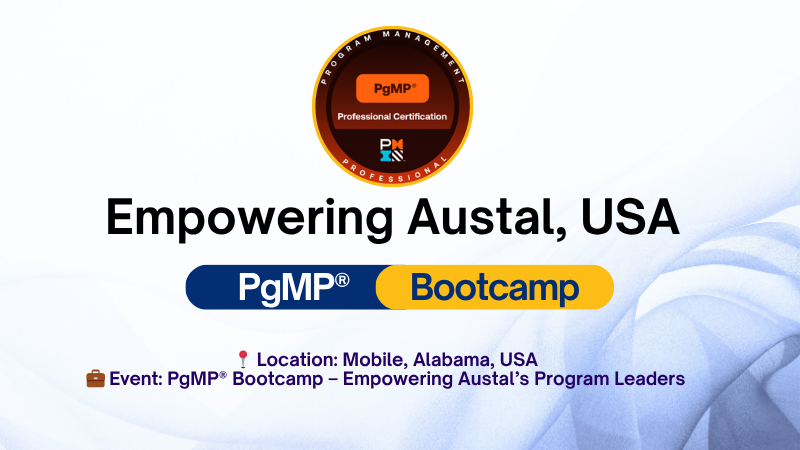

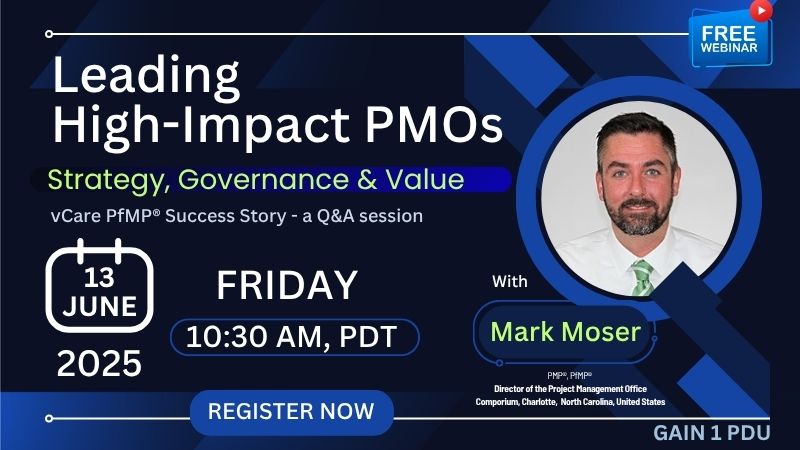
Transform PMO Vision into Strategic Impact – Webinar with Mark Moser | Gain 1 PDU | PMI-ATP
🚀 Transform Your PMO Vision into Strategic Impact!
Join me and the vCare Project Management community for an exclusive webinar featuring Mark Moser, MBA, PMP, PfMP, CSM, LSSBB – Director of the Project Management Office at Comporium, Charlotte, NC, USA.
With 15+ years leading PMOs across healthcare, telecom, and corporate sectors, Mark has earned a reputation for turning complex initiatives into measurable success stories. From ERP rollouts to enterprise dashboarding and capability building, he brings actionable wisdom every PMO leader needs.
Session Date: Friday, 13th June 2025
Session Time:
10:30 AM – 11:30 AM (PDT) / 11:30 AM – 12:30 PM (MDT)
12:30 PM – 01:30 PM (CDT) / 01:30 PM – 02:30 PM (EDT)
02:30 PM – 03:30 PM (BRT) / 06:30 PM – 07:30 PM (BST)
07:30 PM – 08:30 PM (CEST) / 08:30 PM – 09:30 PM (AST)
🔗 Reserve Your Spot Now → https://bit.ly/43s8KVl
🎯 Key Takeaways from the Webinar:
– Laying the Foundation: The First Three Strategic Moves in Building a PMO from Scratch
– From Data to Decisions: How Executive Dashboards Drive Strategic Alignment
– ERP Excellence: Lessons from Leading Multi-Million Dollar, Enterprise-Wide Initiatives
– Bridging the Certification Gap: Training Non-Certified Teams on PMI Best Practices
– Defining High-Impact: What Sets Top-Performing PMOs Apart in Today’s Business Landscape
🎓 Earn 1 PDU
🎁 Special Discounts on upcoming PMP, PgMP & PfMP programs
💬 Book a 1-on-1 call with me: http://talktodharam.com
📌 Explore More:
PfMP Online Training → http://bit.ly/39jOZSf
PfMP Direct Training → http://bit.ly/38er2M3
PfMP4U LinkedIn Group → http://bit.ly/31P7GKR
Let’s redefine PMO leadership—together.
#PMO #PfMP #PMP #ProjectLeadership #ERPStrategy #PortfolioManagement #vCareProjectManagement #PMOTransformation #MarkMoser #DharamSingh #StrategicExecution #PMWebinar #ProgramManagement #LeadershipDevelopment #Comporium #PMICertifications
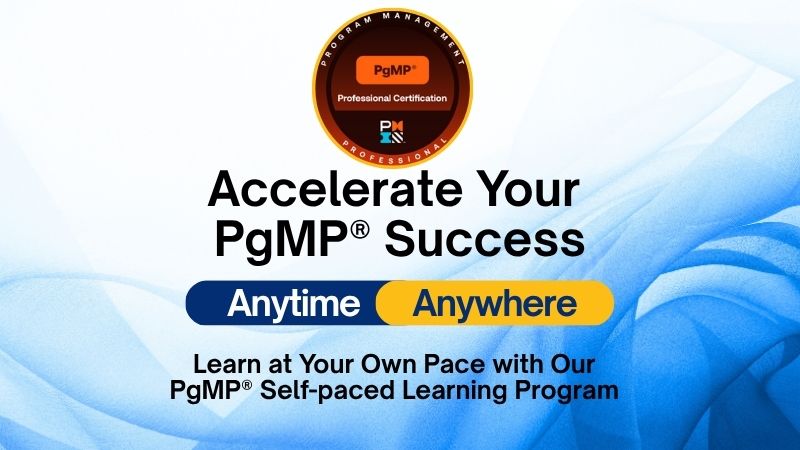
Self-Paced PgMP Program by Dharam Singh – Flexible, Expert-Led, Exam-Focused
🚀 Accelerate Your PgMP® Exam Success – Learn Anytime, Anywhere!
Are you aiming for the prestigious PgMP® (Program Management Professional) certification but struggling to find time?
🎓 At vCare Project Management, we understand the challenges of balancing work, life, and career goals. That’s why we offer a self-paced, expert-led learning program designed specifically for busy professionals.
📈 Join 552+ professionals from 57+ countries who’ve successfully trained under my mentorship and taken their careers to the next level.
What you get:
✅ Flexible Learning
✅ Cost-Effective Access
✅ Expert-Led Sessions
✅ Exam-Focused Materials
🎯 Whether you’re starting your PgMP® journey or preparing for the final step, this program is built to help you succeed—at your own pace.
📌 Program Fee: $499
🌐 Start Learning Today: https://bit.ly/2C4ObVP
🛡️ Trusted by professionals across the globe.
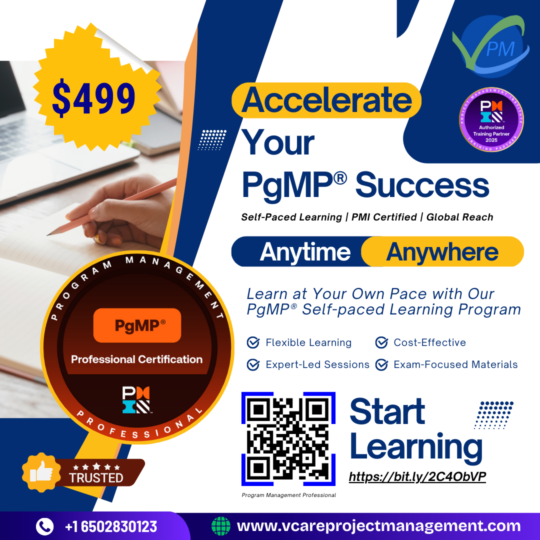
Accelerate your PgMP journey with flexible, expert-led learning—join Dharam Singh’s self-paced program today
👉 Explore More PgMP® Programs:
🔹 Online: http://bit.ly/2oBKQXQ
🔹 Direct Bootcamp: http://bit.ly/2oCfpg0
📘 How to Clear PgMP® in First Attempt: https://bit.ly/2Yo7EvQ
📘 How to Clear PfMP® in First Attempt: https://bit.ly/3BORnPq
🤝 Need guidance? Book a FREE 15-min Consultation with me: 🔗 talktodharam.com
🎥 Subscribe to our YouTube Channel for Q&A, expert talks, and success stories: https://bit.ly/2YF0wJl
🎙️ Follow my podcast series and interviews with global project management experts: https://bit.ly/2NDY8wd
#PgMP #PgMPExam #ProgramManagement #PgMPCertification #PMICertified #ProjectManagementTraining #PgMPPreparation #SelfPacedLearning #PgMPExamPrep #vCareProjectManagement #AccelerateYourSuccess #DharamSingh #PMI #ProgramManager
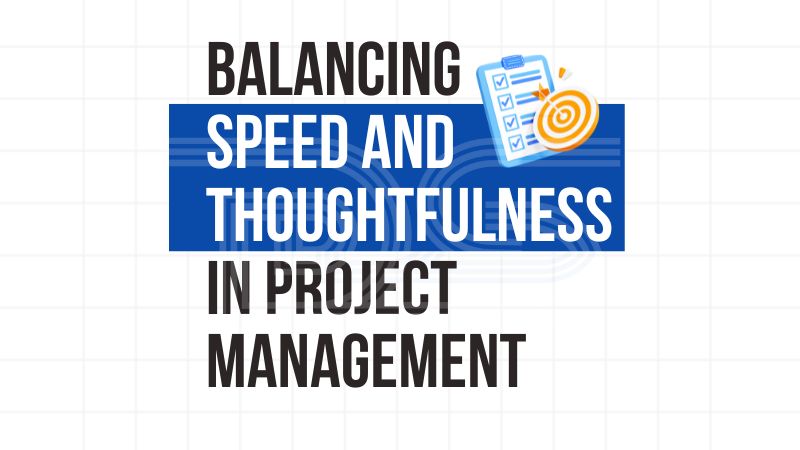
Balancing Speed with Thoughtfulness in Project Management – 5 Essential Principles
⏱️ In the rush to deliver fast, are you forgetting to deliver right?
After mentoring hundreds of project, program, and portfolio managers, I’ve seen one truth stand out: Speed means nothing without thoughtfulness. Swipe through these 5 essential principles to help you find that balance 👇
✅ Prioritize What Matters
– Identify the most critical tasks and focus your resources there
– Not everything needs to be done quickly — some things need to be done right
✅ Plan for Agility
– Use flexible frameworks like Agile or iterative planning
– This helps you adapt to changes while maintaining a thoughtful approach
✅ Communicate Clearly
– Keep your team aligned with clear, concise updates on priorities and timelines
– Thoughtfulness in communication reduces confusion and builds trust
✅ Evaluate Risks Carefully
– Weigh the trade-offs between speed and long-term impact
– Take calculated risks but avoid shortcuts that could lead to project failures
✅ Reflect and Refine
– After each phase, review what worked and what didn’t
– Continuous improvement ensures that speed and thoughtfulness remain balanced throughout the project
💭 Fast isn’t always forward.
👉 How do you personally balance speed with thoughtfulness in your projects?
Let’s open the conversation.
View our upcoming PMP Programs
Online → https://bit.ly/2BU0mFp
Direct → http://bit.ly/3ic7GRF
View our upcoming PgMP® Programs
Online → http://bit.ly/2oBKQXQ
Direct → http://bit.ly/2oCfpg0
View our upcoming PfMP® Programs:
Online → http://bit.ly/39jOZSf
Direct → http://bit.ly/38er2M3
🎙️ Got questions about your Project Management career or PMI certifications?
Book your FREE 15-min session with me at 👉 www.talktodharam.com
📞 Contact Us
Call: 650-283-0123
Email: [email protected]
🎧 Subscribe & Stay Ahead
Webinars & Success Stories: https://bit.ly/2YF0wJl
Podcasts & Interviews: https://bit.ly/2NDY8wd
#ProjectManagement #PgMP #PfMP #PMP #Agile #Leadership #StrategicThinking #DharamSingh #vCareProjectManagement #SpeedVsQuality #PMICertifications #ContinuousImprovement #RiskManagement #TeamAlignment #ProjectLeadership
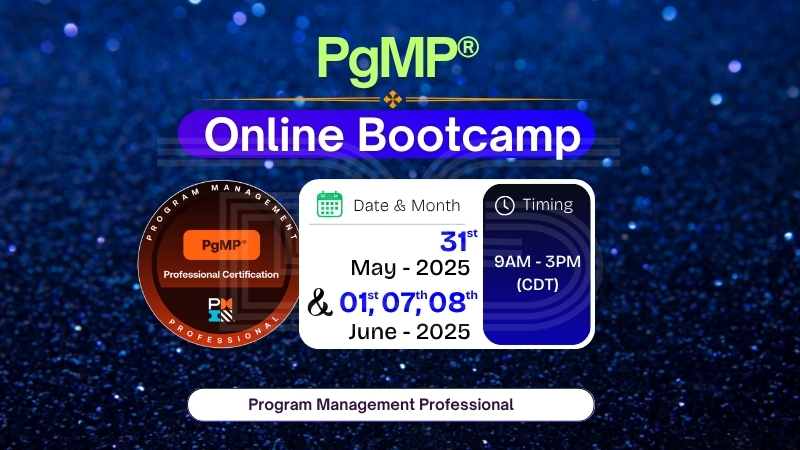
Join Dharam Singh’s PgMP Online Bootcamp – Starts May 31st, 2025
Are you ready to take the next leap in your professional journey?
I’m excited to invite you to my upcoming Program Management Professional (PgMP)® Online Bootcamp, starting on May 31st, 2025. If you’re aiming to earn your PgMP® certification or want to sharpen your leadership in program management, this is the right opportunity for you.
🗓 Bootcamp Dates:
May 31st, June 1st, 7th & 8th, 2025
🕗 Timing: 9 AM – 3 PM (CDT)
🔗 Register now to unlock exclusive offers: http://bit.ly/3Kpk2l8
✨ Here’s what’s included:
✅ Comprehensive training aligned with PMI’s PgMP® standards
✅ PgMP® Complete Reference Guide (aligned with SPM 5th Edition)
✅ Step-by-step Application & Audit Support
✅ Proven Exam Strategies and Success Tips
✅ 48 PDUs / Contact Hours for Certification
Over the years, I’ve had the privilege of mentoring 549+ PgMP® professionals worldwide. This bootcamp is more than just training—it’s a focused experience to help you gain clarity, confidence, and certification.
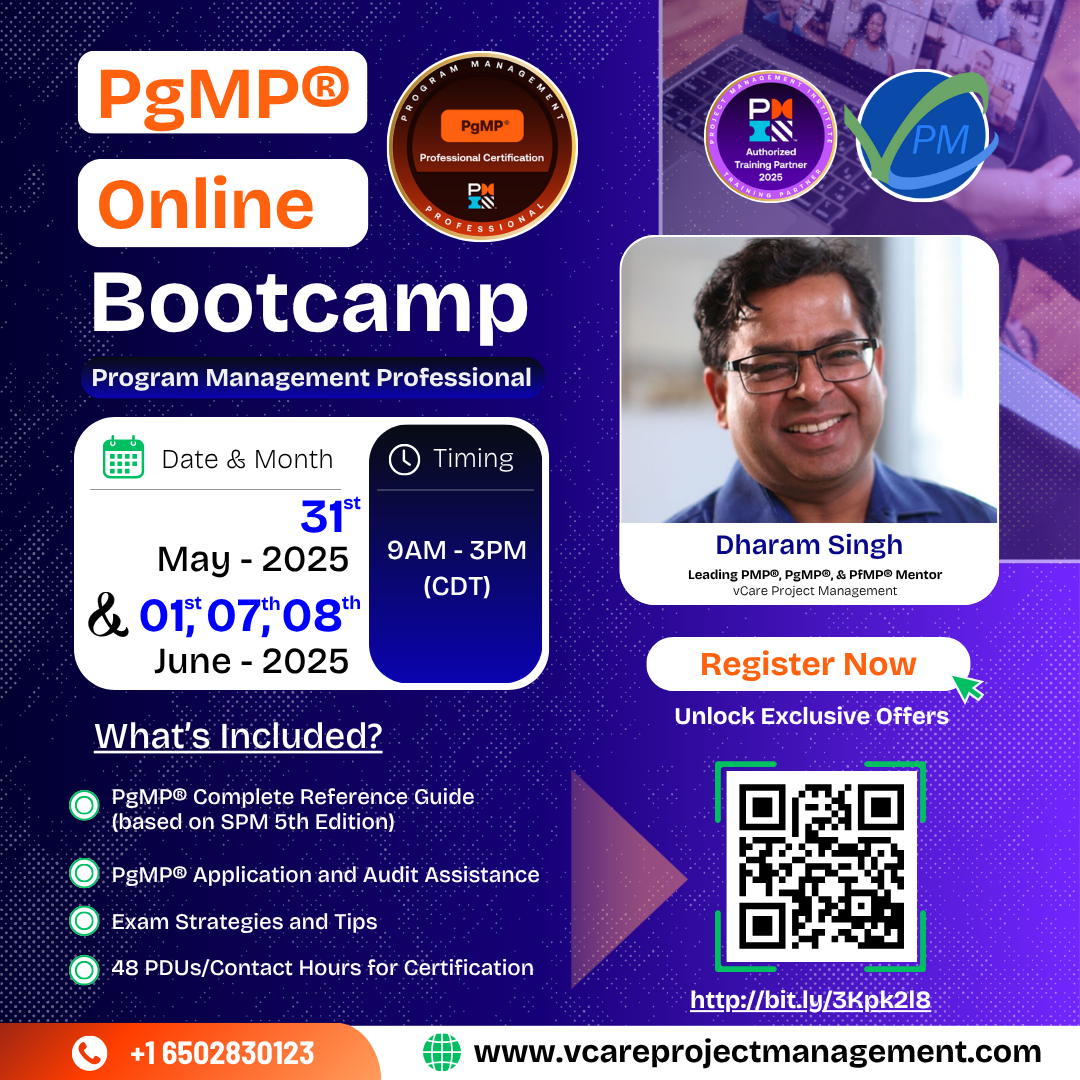
Unlock your PgMP certification goals with Dharam Singh’s expert-led online bootcamp starting May 31st, 2025
View our upcoming PgMP Programs
Online – http://bit.ly/2oBKQXQ
Direct – http://bit.ly/2oCfpg0
📞 For queries: +1 650-283-0123
🎥 Free Consultation with Me: http://talktodharam.com
🎯 Let’s make this the turning point in your PgMP® journey.
#PgMP #ProgramManagement #PMI #PgMPCertification #Bootcamp #DharamSingh #vCareProjectManagement #StrategicLeadership #Mentorship #PMITraining #PgMPBootcamp #CareerGrowth #pgmpexamprep #pgmpcertification

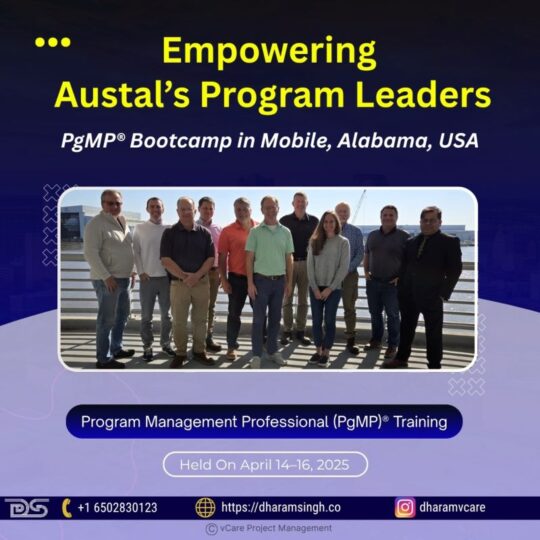

At Austal USA, that question sparked a new journey — and the results were truly inspiring.
📍 Location: Mobile, Alabama, USA
💼 Event: PgMP® Bootcamp – Empowering Austal’s Program Leaders
From April 14–16, 2025, I had the privilege of coaching an exceptional group of program leaders at Austal, a globally respected name in shipbuilding and defense.
What stood out most? Their openness to rethink, relearn, and realign their leadership with enterprise strategy. Over three dynamic days, we explored not just the PgMP® framework, but real-world applications — leading with purpose, precision, and program discipline.
Each conversation, case study, and challenge solved reinforced why program managers are the bridge between vision and value delivery.
🌟 To the Austal USA team: your professionalism and enthusiasm made this bootcamp truly rewarding. I’m grateful for the opportunity to contribute to your growth and leadership journey. Special thanks to PMTraining for making this collaboration possible and for supporting organizations in upskilling their program management talent.